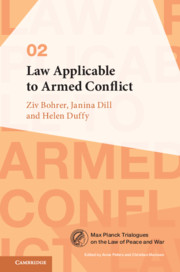Book contents
- Law Applicable to Armed Conflict
- Max Planck Trialogues on the Law of Peace and War
- Law Applicable to Armed Conflict
- Copyright page
- Contents
- Introduction: International Law Governing Armed Conflict
- 1 Trials and Tribulations: Co-Applicability of IHL and Human Rights in an Age of Adjudication
- 2 Divisions over Distinctions in Wartime International Law
- 3 Towards a Moral Division of Labour between IHL and IHRL during the Conduct of Hostilities
- Conclusions: Productive Divisions
- Index
- Books in the Series
Conclusions: Productive Divisions
Published online by Cambridge University Press: 09 January 2020
- Law Applicable to Armed Conflict
- Max Planck Trialogues on the Law of Peace and War
- Law Applicable to Armed Conflict
- Copyright page
- Contents
- Introduction: International Law Governing Armed Conflict
- 1 Trials and Tribulations: Co-Applicability of IHL and Human Rights in an Age of Adjudication
- 2 Divisions over Distinctions in Wartime International Law
- 3 Towards a Moral Division of Labour between IHL and IHRL during the Conduct of Hostilities
- Conclusions: Productive Divisions
- Index
- Books in the Series
Summary
Which law applies to armed conflict situations? The contributions to this Trialogue have tackled and answered this question from different angles. Helen Duffy provided a study of the current practice of co-application of IHL and IHRL with a particular focus on litigation before international human rights courts and developed a framework for the co-applicability of both regimes. Ziv Bohrer espoused a historical perspective to challenge recent crisis narratives which assert that IHL is unfit to respond to recent developments in warfare. He made the case that IHL is the better suited system to regulate armed conflict situations. Janina Dill approached the interplay between IHL and IHRL as a moral question and proposed a moral division of work between both regimes which caters for the moral goals of guiding soldiers’ behaviour and protecting victims. Which overall conclusions can we draw? Where do the chapters converge in substance, where do they disagree? Our concluding reflections aim to pull the strings of the Trialogue together and seek to identify common positions and fault lines.
- Type
- Chapter
- Information
- Law Applicable to Armed Conflict , pp. 266 - 279Publisher: Cambridge University PressPrint publication year: 2020



